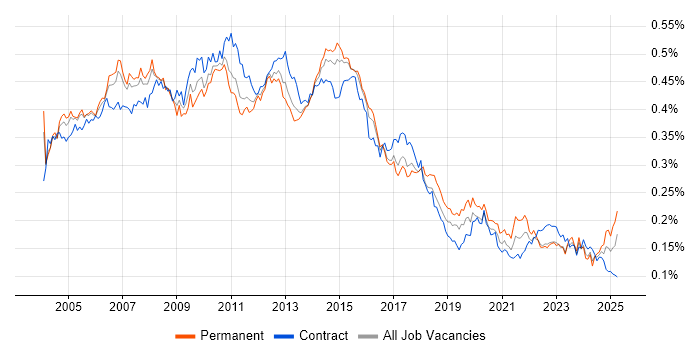Business System Analyst
UK
The median Business System Analyst salary in the UK is £57,500 per year, according to job vacancies posted during the 6 months leading to 28 May 2025.
The table below provides salary benchmarking and summary statistics, comparing them to the same period in the previous two years.
| 6 months to 28 May 2025 |
Same period 2024 | Same period 2023 | |
|---|---|---|---|
| Rank | 618 | 772 | 844 |
| Rank change year-on-year | +154 | +72 | +111 |
| Permanent jobs requiring a Business Systems Analyst | 93 | 138 | 120 |
| As % of all permanent jobs advertised in the UK | 0.17% | 0.14% | 0.12% |
| As % of the Job Titles category | 0.19% | 0.14% | 0.13% |
| Number of salaries quoted | 73 | 119 | 102 |
| 10th Percentile | £38,700 | £29,550 | £38,500 |
| 25th Percentile | £46,250 | £35,700 | £44,563 |
| Median annual salary (50th Percentile) | £57,500 | £43,500 | £55,000 |
| Median % change year-on-year | +32.18% | -20.91% | +4.76% |
| 75th Percentile | £70,000 | £57,250 | £62,188 |
| 90th Percentile | £82,750 | £77,500 | £67,500 |
| UK excluding London median annual salary | £52,750 | £42,500 | £50,000 |
| % change year-on-year | +24.12% | -15.00% | +11.11% |
All Permanent IT Job Vacancies
UK
For comparison with the information above, the following table provides summary statistics for all permanent IT job vacancies. Most job vacancies include a discernible job title that can be normalized. As such, the figures in the second row provide an indication of the number of permanent jobs in our overall sample.
| Permanent vacancies in the UK with a recognized job title | 49,435 | 96,820 | 89,564 |
| % of permanent jobs with a recognized job title | 90.41% | 94.78% | 91.46% |
| Number of salaries quoted | 25,727 | 69,155 | 56,824 |
| 10th Percentile | £28,822 | £28,500 | £32,500 |
| 25th Percentile | £41,000 | £38,500 | £45,000 |
| Median annual salary (50th Percentile) | £55,000 | £52,500 | £60,000 |
| Median % change year-on-year | +4.76% | -12.50% | - |
| 75th Percentile | £73,750 | £70,000 | £80,000 |
| 90th Percentile | £96,250 | £90,000 | £100,000 |
| UK excluding London median annual salary | £51,399 | £50,000 | £53,500 |
| % change year-on-year | +2.80% | -6.54% | +6.63% |
Business Systems Analyst
Job Vacancy Trend
Job postings that featured Business Systems Analyst in the job title as a proportion of all IT jobs advertised.

Business Systems Analyst
Salary Trend
3-month moving average salary quoted in jobs citing Business Systems Analyst.
Business Systems Analyst
Salary Histogram
Salary distribution for jobs citing Business Systems Analyst over the 6 months to 28 May 2025.
Business Systems Analyst
Top 17 Job Locations
The table below looks at the demand and provides a guide to the median salaries quoted in IT jobs citing Business Systems Analyst within the UK over the 6 months to 28 May 2025. The 'Rank Change' column provides an indication of the change in demand within each location based on the same 6 month period last year.
| Location | Rank Change on Same Period Last Year |
Matching Permanent IT Job Ads |
Median Salary Past 6 Months |
Median Salary % Change on Same Period Last Year |
Live Jobs |
|---|---|---|---|---|---|
| England | +115 | 89 | £57,500 | +27.78% | 48 |
| UK excluding London | +134 | 56 | £52,750 | +24.12% | 39 |
| London | +134 | 36 | £60,000 | -22.58% | 12 |
| Midlands | +67 | 22 | £55,000 | +10.00% | 8 |
| Work from Home | +92 | 20 | £52,500 | +10.53% | 30 |
| East Midlands | +47 | 15 | £55,000 | -18.52% | 4 |
| South East | +69 | 11 | £45,000 | +17.65% | 11 |
| East of England | +19 | 10 | £60,000 | +41.18% | 5 |
| West Midlands | +63 | 7 | £55,000 | +22.22% | 4 |
| North of England | +24 | 7 | £50,000 | +5.26% | 11 |
| North West | -13 | 4 | £54,000 | +13.68% | 7 |
| South West | +114 | 2 | £52,500 | +31.25% | 1 |
| Yorkshire | +58 | 2 | £47,500 | +18.75% | 4 |
| Wales | - | 2 | £57,500 | - | 1 |
| Scotland | +120 | 1 | £48,500 | +28.31% | 3 |
| North East | - | 1 | £50,000 | - | |
| Northern Ireland | - | 1 | - | - |
Business Systems Analyst Skill Set
Top 30 Co-occurring Skills and Capabilities
For the 6 months to 28 May 2025, Business Systems Analyst job roles required the following skills and capabilities in order of popularity. The figures indicate the absolute number co-occurrences and as a proportion of all permanent job ads featuring Business Systems Analyst in the job title.
|
|
Business Systems Analyst Skill Set
Co-occurring Skills and Capabilities by Category
The follow tables expand on the table above by listing co-occurrences grouped by category. The same employment type, locality and period is covered with up to 20 co-occurrences shown in each of the following categories:
|
|
|||||||||||||||||||||||||||||||||||||||||||||||||||||||||||||||||||||||||||
|
|
|||||||||||||||||||||||||||||||||||||||||||||||||||||||||||||||||||||||||||
|
|
|||||||||||||||||||||||||||||||||||||||||||||||||||||||||||||||||||||||||||
|
|
|||||||||||||||||||||||||||||||||||||||||||||||||||||||||||||||||||||||||||
|
|
|||||||||||||||||||||||||||||||||||||||||||||||||||||||||||||||||||||||||||
|
|
|||||||||||||||||||||||||||||||||||||||||||||||||||||||||||||||||||||||||||
|
|
|||||||||||||||||||||||||||||||||||||||||||||||||||||||||||||||||||||||||||
|
|
|||||||||||||||||||||||||||||||||||||||||||||||||||||||||||||||||||||||||||
